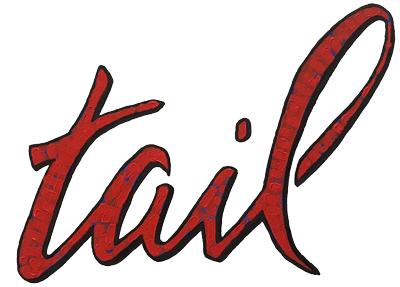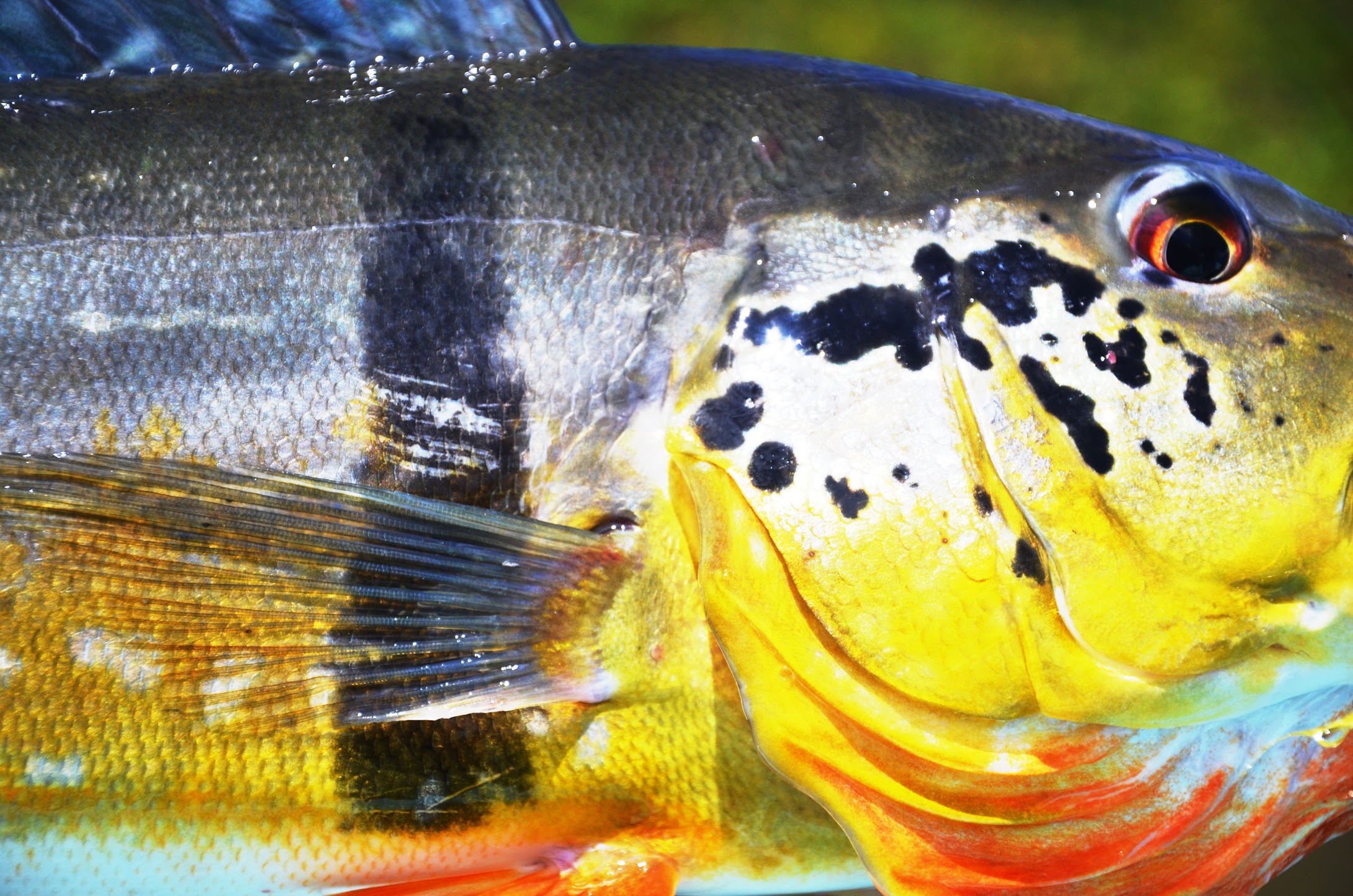Peacock Bass in Brazil
Getting to Brazil’s Agua Boa Amazon Lodge is a bit of a haul, but trust me: if you want a great peacock bass experience, it’s worth the effort. The lodge is located 200 miles northwest of Manaus on the Agua Boa River, a practically uninhabited tributary of the Rio Branco. You have to fly from Miami to Manaus, stay overnight in a hotel (and by overnight I mean you need to wake up at an ungodly time after three hours of sleep on what feels like a concrete slab). Then, just after sunrise, there’s an hour-long flight in a small propeller plane, covering hundreds of miles of uninhabited lush, green rainforest, before bouncing down on the lodge’s private runway.
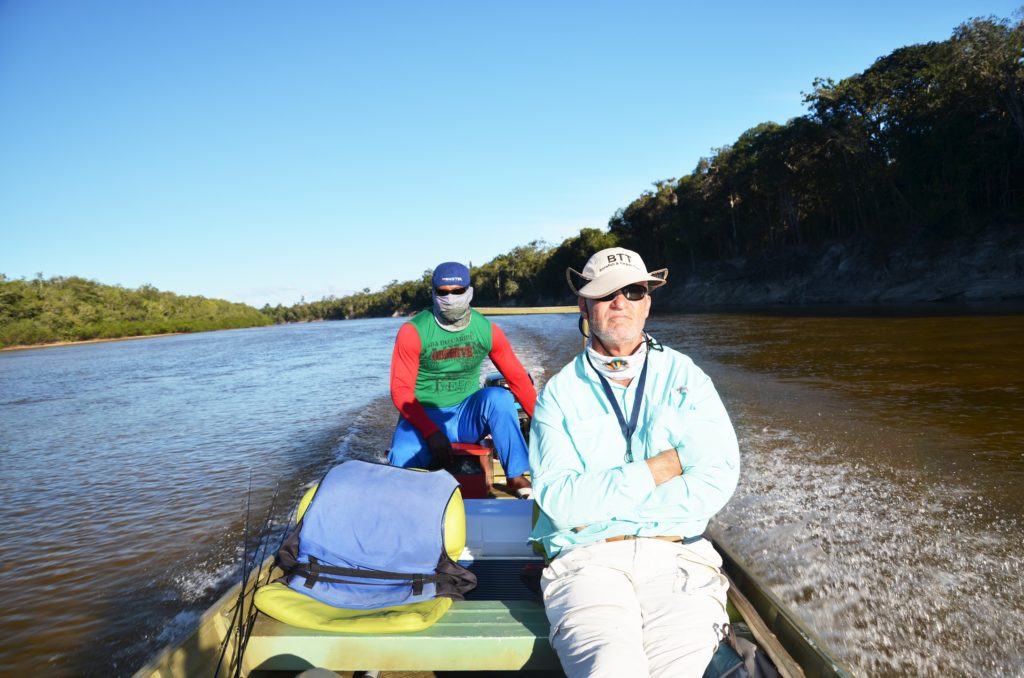
There is almost nothing and nobody else around for hundreds of miles. There are reports that natives peer out at anglers from the tree-choked riverbanks, and there’s the hard evidence of a broken spearhead pulled from a giant peacock bass my friend caught on our last trip here.
But the Agua Boa Amazon Lodge itself is welcoming. Friendly lodge staff greets us with glasses of champagne (a little early perhaps, but a few of us grab them anyway), and breakfast is laid out in the main lodge. Blinking with exhaustion, we scarf down some food and coffee, catch up with Charlie and Carlos, the awesome lodge managers, and then it’s time to hit the water.
We all race to get to the boats first, hurriedly assembling our fly rods, slapping on sunscreen, checking our bags and yelling at our fishing partners to hurry the hell up. You can’t beat the access here—the river is literally 50 feet from the guest bungalows. Over the course of the weeklong trip, we fish with a rotating schedule of guides and boat mates, and each guide has his own beat, meaning you get to fish different water each day. On the day we arrived, the guides were already waiting for us in their green aluminum jon boats, perched on the poling platforms, and they helped us load our gear into the boats. They don’t speak much English, but they know enough to get you onto fish.
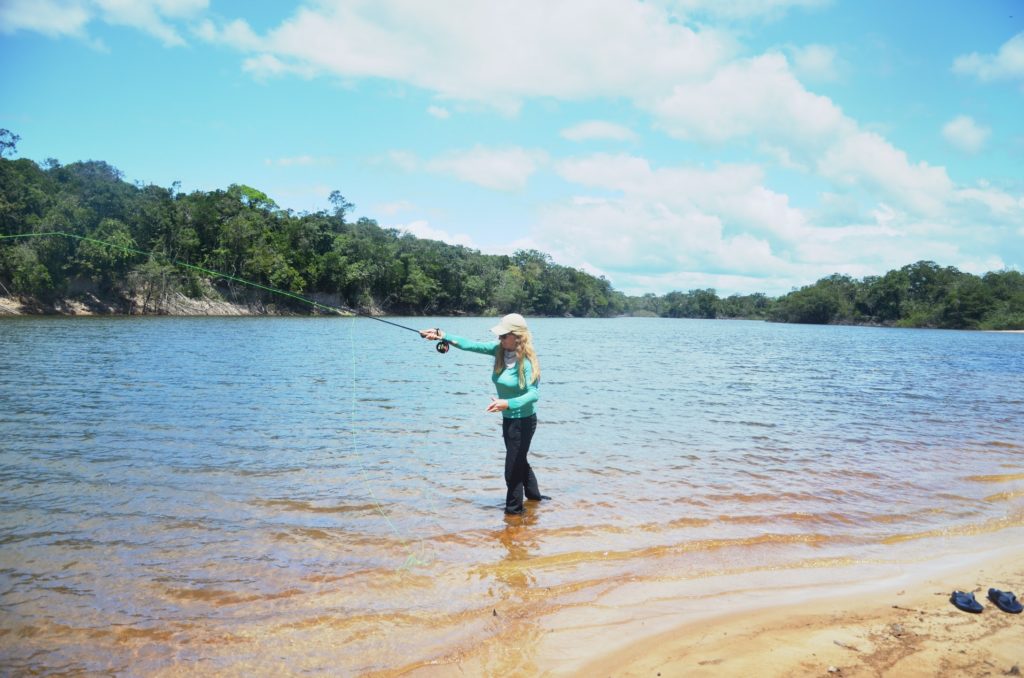
The fishing terrain is greatly varied—sometimes you fish the main river, chucking flies at the banks and threading the needle around downed trees and rocks to where peacock bass lie in wait. There are ample opportunities to fish lagoons, casting to bedding fish and fish swimming or floating near the surface, and smaller branches of the river, sight fishing cruising packs of peacocks on sandy flats or casting to laid-up fish guarding their spots on shallow banks.
Sometimes you bushwhack into lagoons, or even ditch the boat and hike through the jungle, the guide wielding a machete to cut through overgrown paths (and to dispatch any snakes that come too near) to reach another boat that has been stored in an otherwise inaccessible lagoon.
I am also amazed at the flats fishing here, reminiscent of fishing the Keys for bonefish or tarpon—there are opportunities for heart-in-your-throat casts to strings of 15-plus pound peacocks cruising the sandy flats in two feet of water. It’s hard to describe the excitement and chaos as all the fish simultaneously pounce on your fly until one fish comes up victorious.
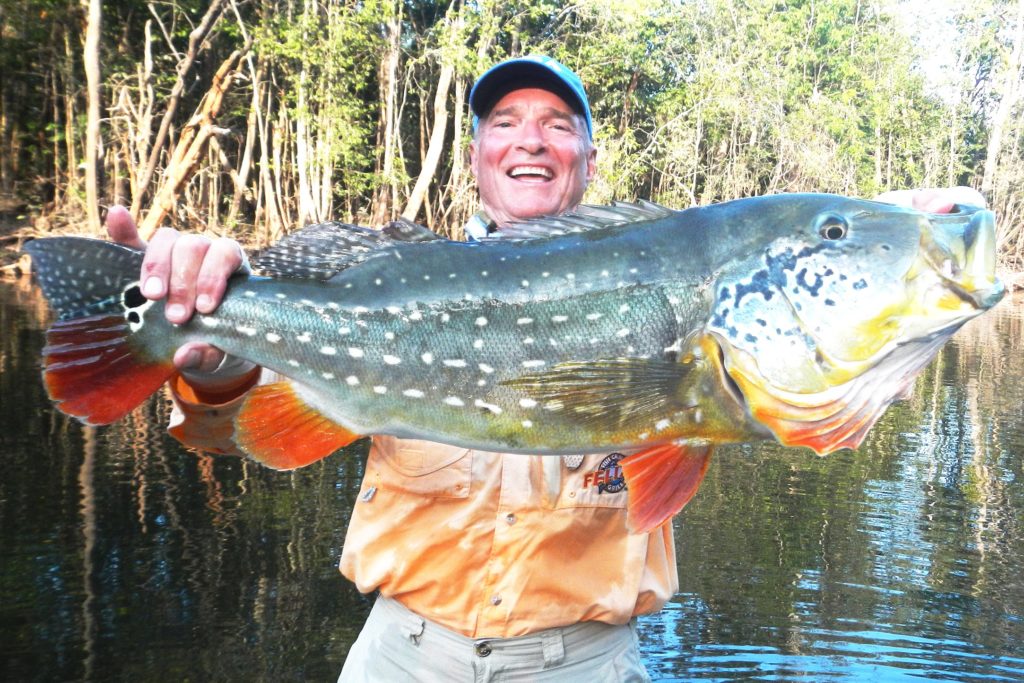
The amazing thing about peacock bass is how utterly aggressive and ruthless they are. Oftentimes the bigger fish are caught when your boat mate hooks up to a small fish, and the giant fish stir up from the depths to try to cannibalize them (why do you think so many peacock flies look like small peacocks?). One well-placed fly next to the little fish, and you’re immediately hooked up to a monster. Cast to a fish guarding a bed or its territory on the bank and they will literally throw themselves out of the water, exploding on your fly. At times, the guide can just dig in his heavy wooden pole and perch on the poling platform as fish come at your boat from every direction, and you and your partner throw frantic casts from either end of the boat. The more frenetic and chaotic the fish become as they crash on your fly, the more fish show up to join the party.
I fish with my brother Chase on the first day. I have been here before, but this is his first trip to Agua Boa. It is a surreal experience to fish this place. The terrain and the river are unlike anything you’ve ever seen. You are surrounded by high banks of trees on either bank, strange looking birds, otters and dolphins, and caiman sunbathing on the sand or sinking low in the water, glaring through angry yellow eyes as your boat passes. Occasionally the caiman try to come after a hooked fish, and I have one incident later in the week where one stared at me and aggressively approached the boat after I released a fish, forcing the guide to swing at it several times with the push pole.
But the fishing is the biggest draw. Our first day is solid; we each catch a ton of small fish and a couple over 10 pounds. We head back to the dock exhausted and happy.
We are one of the last boats to return and are greeted by a smiling woman with caipirinhas, a Brazilian specialty made with the sugar-cane liquor called cachaca. As we sip our drinks, Charlie comes up to us, speaking in a low voice. “Hey guys, there’s a little, uh, situation. Your dad got bitten by a piranha today. He’s okay, but he lost a little chunk of his finger.” Our first reaction is “oh shit,” and we run up to my dad’s bungalow. He is inside, finger wrapped in gauze, a panicked look on his face. I ask how bad it is and he says that it’s pretty gruesome (I confirm this when I peek under the bandage) and incredibly painful.
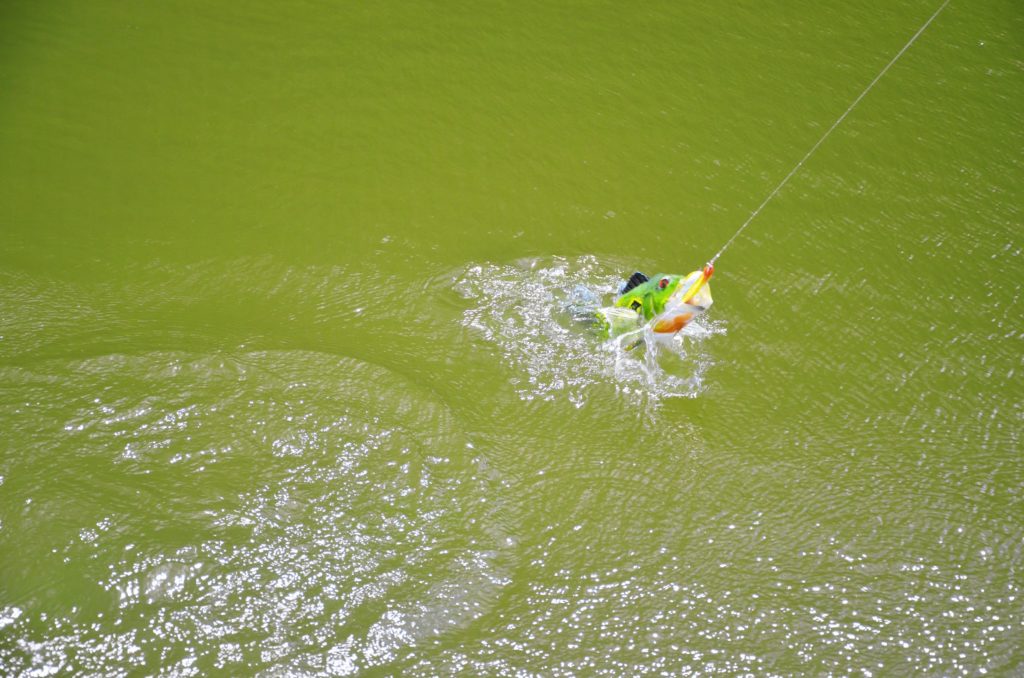
His fishing partner was an older guy and had caught the piranha, and my dad was trying to be helpful by taking it off the hook. He held the line in one hand and reached down to try to wrangle the hook out (pliers would have been a good bet here) and the fish jumped up and took off the top of his thumb with its razor sharp teeth. As he described it, the other guy didn’t realize what happened and went back to fishing as my dad was bleeding to death in the back of the boat.
Pretty much in unison, my brother and I hold back laughter and exclaim, “THAT’S BADASS! How many people can say they have a scar from a piranha bite?!” In true form, his biggest concern is his ability to fish the rest of the week. He has to nurse scotch and painkillers to get through the nights, but manages to keep fishing through the injury, and it fortunately doesn’t cause any permanent damage. He also gets sweet revenge on one of the last nights when piranha is on the dinner menu.
The rest of the trip goes off without a hitch, and each day I manage to land a minimum of 30 fish, and always a handful over 10 pounds. I am fortunate to get my favorite guide, Preto, three different days on this particular trip. He is one of the youngest guides, speaks decent English, has unbelievably good eyes, and has the build to pole after fish that seem out of reach. We get to that great point where a guide and angler are utterly in tune with each other—when he quietly says, “Alex, 9 o’clock, look,” and he points, I’m firing off a cast a half-second later. He rarely expresses emotion, and I make it my mission to make Preto laugh. He is also willing to try anything—other guides roll their eyes and shake their heads as I hold up giant poppers and eight-inch-long bright chartreuse streamers, pleading with them to let me try them out.
Scott and I fish with Preto on the third day, and back in a quiet lagoon, Scott pulls out the most ridiculous giant peacock pattern popper I have ever seen. Preto nods and smiles, “It’s okay!” We tie that bad boy on and it feels like casting a lead weight. The thing pushes a ton of water and makes an absolute racket. I laugh uncontrollably as I strip it across the water, but keep trying anyways. Suddenly, Preto starts spotting big fish coming at the boat. I launch a well-placed cast in front of them, and they absolutely demolish the popper, heads and bodies exploding out of the water, fighting to have the privilege of eating it. The next three hours provide non-stop action with this one popper. At times, we are doubled over in laughter at the utter ridiculousness of the situation. Fish come of nowhere, accelerating and hammering the fly two feet from the boat and scaring the shit out of us. I manage to get my biggest fish of the day making a long cast to a male and female pair cruising a sandy flat. My first cast, the smaller (about 14-pound) female pounces on the fly and I hook up. I somehow lose her pretty quickly when she jumps, and I see the larger male fish still swirling up sand, looking for the bait that she beat him to. I throw a cast right to him and he hammers the fly and he spends the next 10 minutes putting holes in the water before I land him and take a quick photo before gently releasing him back to his mate.
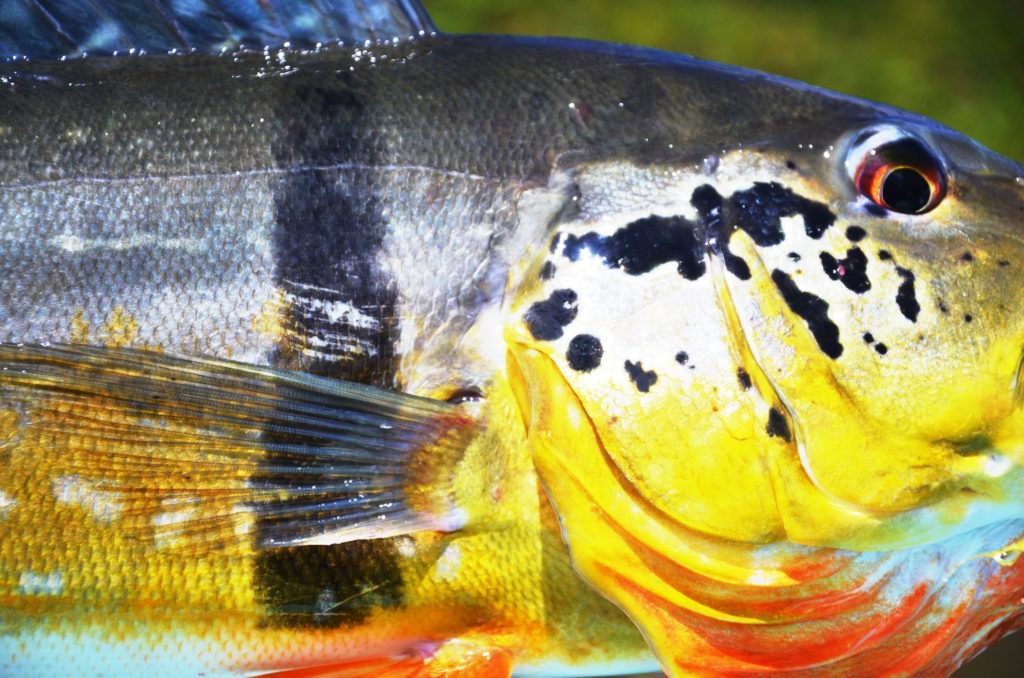
Agua Boa provides opportunities to not only catch three different species of peacock bass, but also piranha, pirarucu (also known as arapaima, the giant freshwater fish that roll and breathe air and fight like tarpon), pacu, and arowana, fish that have bottom halves that look like eels, and slither through the water in iridescent schools. Strip the fly slowly through them and these slow moving fish suddenly erupt into jumping machines. By the third day, most of us have piranha, all three species of peacocks, and arowana under our belts, and some people have caught jacunda (I still have a full slime imprint from one of these little bastards on a pair of fishing pants), payara (looks like a prehistoric salmon with razor sharp saber teeth, also known as “vampire fish”), and traira (“wolf fish”).
You never know what you’re going to get here, and my appetite for fishing is insatiable. Lunch breaks (and naps for the guides) are taken by the banks under trees, and after scarfing down some food, I usually hop out and wade the shallow nearby spots, my bare feet getting gently nibbled by the tiny doctor fish (Garra rufa, the same thing people pay good money for in spas in the States and elsewhere – for more, see Tail Issue 11’s piece “Does This Really Exist? A Fish Spa?”) as I hook into more bass.
One night, Charlie shows us photos from a guy the week before who managed to catch a giant, probably 150-pound, pirarucu. Unbelievable photos of this giant fish jumping clear out of the water during an hour-long fight put me on a mission to catch one.
The next day, I’m on the bow and we are fishing in a somewhat murky lagoon and the guide points to this giant shadow up ahead. “Pirarucu,” he says casually. I blink in disbelief. “That’s a fish?” He replies, “pirarucu.” I’m practically rolling my eyes because there is no way in hell that that’s a fish. Then the giant shadow starts to move and my heart jumps in my throat. The thing must have weighed over 200 pounds. I make what looks like a good cast to it, but the fish fades away into the murk. I am now even more determined.
The next day, I am fishing with my brother again; we’re with the guide who is the self-proclaimed master of catching pirarucu. He has three under his belt this season, out of the lodge’s four total that have been caught. All day, I am insistent on trying to catch pirarucu, and he finally takes us to the lagoon where most of them have been caught. We are both pretty excited, until the guide tells us to pull out a sinking line, and we spend the next hour dredging. I pretty quickly get over my obsession.
On the last day of fishing, another guest—who had been disappointed by his lack of a really big fish—manages to actually hook one of these monsters, and I get a twinge of jealousy.
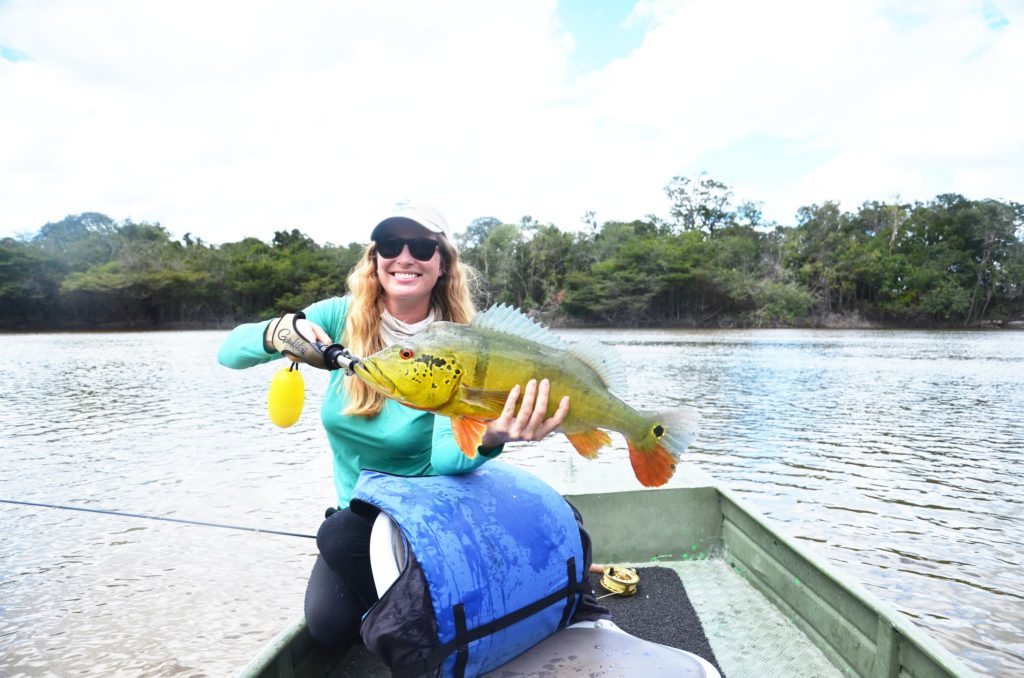
Toward the end of the trip, we are all exhausted, fingers tender and sliced up from strip-strikes and arms stiff from casting. Each night, we sip caipirinhas in the pool overlooking the river, swatting away noseeums, and then drag our tired bodies into the main lodge for a huge dinner spread. We try to keep our eyes open for the football games that are on TV (the commentators speaking in Portuguese), and we enjoy a few drinks, cigars, and games of cards before collapsing into bed and doing it all over again. By the end of the trip, several rods have been broken, and a great many flies permanently retired, just a few threads and sad remnants of feathers and fur left on the hooks.
On the last day, I fish with my dad and Preto one last time, and we have the most epic fishing day of the whole trip. Preto takes us all the way up where the river narrows, as far north as you can fish here; it takes over an hour to get there. It’s an area I’ve never fished, but my dad remembers fishing it years back when he first came here. Apparently the fishing is absurdly good up here, and nobody else from our group has been up this far.
We fish poppers all day, and to say that we hooked a fish on every cast that day is barely stretching the truth. We got into one spot where you could jump five fish on one retrieve. Giant fish pouring across the flat, huge schools of smaller fish holed up and fighting each other to get at our flies, and so much nonstop action from both ends of the boat that we both finally have to sit down and drink a bottle of water because we are so exhausted and shaking from adrenaline. We get numerous sight-fishing shots at small packs of 15-pounders cruising the flats or on the surface in deeper water in search of food. And for the first time in our lives, we are ready to call it a day, without protest, when Preto tells us unsmilingly that it’s time to head back to the lodge.
